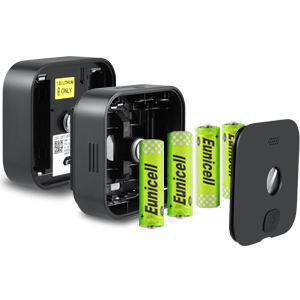If you’re using Blink cameras to keep your home secure, you’ll want to ensure they run smoothly.
Yes, you can use regular alkaline batteries in Blink cameras, but it’s not recommended. Blink cameras work best with AA 1.5-volt lithium non-rechargeable batteries for better performance and longer battery life.
In this article, we’ll explain why it’s best to use lithium batteries, what happens if you use regular ones, and how to ensure your Blink cameras stay powered up and ready to protect your home.
Understanding Blink Camera Power Requirements
Blink cameras are designed to work with specific batteries to perform their best. The company recommends using AA lithium batteries because they last longer and deliver steady power. Blink devices are made to operate on low power, so choosing the right batteries is crucial.
Using incompatible batteries, like regular alkaline ones, may cause issues like short battery life or interruptions in the camera’s performance.
Lithium batteries are better suited for Blink cameras, especially because they efficiently handle tasks like motion detection and video recording. Picking the right batteries ensures hassle-free usage.
Regular Batteries vs. Recommended Batteries

1. Alkaline Batteries Explained
Alkaline batteries are common and affordable, making them a go-to option for many devices. However, they’re not ideal for high-performance gadgets like Blink cameras.
They lose power faster, especially in cold weather or during heavy use, and don’t provide consistent voltage. This can lead to poor performance or frequent replacements, making them less reliable for Blink devices.
2. Lithium Batteries Explained
Lithium batteries are powerful and long-lasting, making them perfect for Blink cameras. They work well in extreme temperatures and provide steady voltage, ensuring your camera operates smoothly.
While they cost more upfront, they save money over time because they need fewer replacements. Lithium batteries also handle the high demands of video recording and motion detection better than alkaline ones.
3. Key Differences
- Voltage Output: Lithium batteries provide a more consistent voltage, whereas alkaline batteries can quickly lose power.
- Lifespan: Lithium batteries last significantly longer than their alkaline counterparts.
- Cost: Alkaline batteries are cheaper initially, but lithium batteries are more cost-effective over time due to their longevity.
Also Read: Can You Watch Blink Cameras On Computer – Complete Guide!
Can You Use Regular Alkaline Batteries With Blink?
Yes, you can use regular alkaline batteries with Blink cameras, but it’s not the best choice. Alkaline batteries drain quickly and don’t provide steady power, affecting the camera’s performance.
Blink recommends lithium batteries because they last longer and work better with their devices. Using alkaline batteries may result in more frequent replacements and lower efficiency.
Benefits of Using Lithium Batteries With Blink
1. Longer Battery Life
Lithium batteries last much longer than regular alkaline batteries. Blink cameras can work for up to two years under normal conditions. This means fewer battery changes and less hassle for you.
2. Works in Extreme Temperatures
Lithium batteries are built to handle hot or cold weather. Whether it’s freezing winter or scorching summer, they keep your Blink cameras running without issues.
3. Consistent Power Supply
Lithium batteries provide steady power, ensuring your Blink cameras work smoothly. This is especially important for features like motion detection and night vision.
4. Saves Money Over Time
Even though lithium batteries cost more upfront, they save you money in the long run. Their durability means fewer replacements, so you spend less overall.
5. Prevents Performance Issues
With lithium batteries, your Blink cameras stay reliable. You won’t face problems like sudden shutdowns or missed recordings, giving you peace of mind.
Downsides of Using Regular Batteries in Blink Cameras

Regular alkaline batteries drain quickly and often fail to provide consistent power. This can lead to shorter recording times, slower motion detection, and frequent battery changes.
Additionally, alkaline batteries are more likely to leak, which could damage your Blink camera. While cheaper upfront, regular batteries may cause more frustration and costs in the long run.
Why Blink Recommends Lithium Batteries
Blink recommends lithium batteries because they’re designed to handle the camera’s power needs. Lithium batteries last longer, work in extreme temperatures, and provide steady power.
This ensures the cameras perform smoothly, especially during recording or motion detection. While they cost more upfront, lithium batteries save time, money, and maintenance by reducing the need for frequent replacements.
Must Know: Why Are There Security Cameraas In Theif: Myths Vs Reality!
What Happens if You Use Regular Batteries in Blink Cameras?
- Short Battery Life: Regular batteries drain quickly, needing frequent replacements.
- Inconsistent Performance: The camera may stop working properly, especially during recording or motion detection.
- Temperature Issues: Regular batteries struggle in extreme hot or cold conditions.
- Increased Maintenance: Frequent battery changes mean more time and effort.
- Risk of Leaks: Alkaline batteries are more likely to leak, potentially damaging your camera.
Testing Regular Batteries in Blink Cameras
- Quick Drainage: Regular batteries run out much faster than lithium ones.
- Poor Cold Weather Performance: Alkaline batteries don’t work well in freezing temperatures.
- Inconsistent Power: Regular batteries may cause the camera to miss recordings or fail during motion detection.
- Temporary Solution: They might power the camera briefly but not reliably in the long run.
How to Choose the Best Batteries for Blink Cameras
- Pick AA Lithium Batteries: They last longer and work consistently.
- Go for Trusted Brands: Energizer and Duracell are reliable options.
- Avoid Cheap Alternatives: Low-cost batteries may not provide steady power.
- Check Compatibility: Ensure the batteries meet Blink’s recommendations.
- Consider Temperature Tolerance: Choose batteries that work well in hot and cold conditions.
Rechargeable Batteries and Blink Cameras

While rechargeable batteries might seem cost-effective, they’re not recommended for Blink cameras. Most rechargeable batteries, like NiMH (Nickel-Metal Hydride), have lower voltage than lithium batteries, which can cause your camera to perform poorly.
They also don’t last as long and may need frequent charging. While they are eco-friendly, rechargeable batteries can impact the efficiency and reliability of your Blink cameras over time.
Tips to Extend Battery Life in Blink Cameras
1. Adjust Motion Detection Sensitivity
Lowering the sensitivity of your motion detection can reduce unnecessary activity. This means your camera won’t be triggered by small movements like passing cars or trees blowing in the wind, saving battery life.
2. Optimize Camera Placement
Place your Blink cameras in areas where they aren’t constantly triggered by motion, like busy streets or places with many pets. This reduces the number of recordings and conserves power.
3. Reduce Video Quality
If you don’t need high-definition video, reducing the video quality can extend battery life. Lower video quality uses less energy, making the camera more efficient.
4. Turn Off Live View When Not Needed
Avoid using the live view feature unless necessary. Constantly streaming video uses more power, so turning it off when not in use will help save battery life.
5. Regularly Check for Firmware Updates
Keep your Blink cameras updated with the latest firmware. Updates often include energy-saving features that can help optimize battery use and improve overall performance.
Battery Safety Tips for Blink Cameras
- Store Batteries Properly: Keep batteries in a cool, dry place to prevent leaks and damage.
- Avoid Mixing Old and New Batteries: Don’t mix old batteries with new ones, which can cause an uneven power supply.
- Dispose of Used Batteries Correctly: Recycle used batteries at a proper disposal location to avoid environmental harm.
- Check for Leaks Regularly: Inspect batteries often for signs of leakage and replace them if needed.
- Don’t Overcharge Rechargeables: If using rechargeable batteries, avoid overcharging them to prevent damage and reduce lifespan.
Can You Use Regular Batteries with Blink Camera?
Yes, you can use regular alkaline batteries in Blink cameras, but it’s not recommended. They drain quickly and may not work well in extreme temperatures.
Lithium batteries are a better choice because they last longer and provide more reliable power for your Blink camera’s performance.
Can You Use Regular Batteries with Blink Battery?
While you can use regular alkaline batteries in Blink battery-operated devices, it’s not ideal. Alkaline batteries often lose power fast, causing your Blink device to perform poorly.
It’s best to use AA lithium batteries for longer battery life and better performance, as they work more efficiently with Blink devices.
Read Out: Do Speed Signs Have Cameras – Everything You Need to Know!
What Happens if You Use Alkaline Batteries Instead of Lithium in Blink?
Using alkaline batteries instead of lithium in Blink cameras might cause shorter battery life and inconsistent performance.
Alkaline batteries can cause your camera to drain faster, resulting in frequent battery changes. They may also struggle in extreme temperatures, making them less reliable than lithium batteries.
Replacement Batteries for Blink Cameras

When replacing batteries in Blink cameras, always choose AA lithium batteries. Lithium batteries provide long-lasting power and perform well in hot and cold conditions.
They also deliver a consistent voltage, ensuring your Blink cameras work reliably. Stick to trusted brands like Energizer or Duracell for the best results.
AA Lithium Batteries
AA lithium batteries are the recommended power source for Blink cameras. They last much longer than regular alkaline batteries, with up to two years of battery life under normal usage.
Lithium batteries work well in extreme temperatures and provide consistent power, making them the ideal choice for your Blink camera’s smooth performance.
Best Replacement Batteries for Blink Cameras
The best replacement batteries for Blink cameras are AA lithium batteries from trusted brands like Energizer or Duracell.
These batteries offer long-lasting power, work in extreme weather, and provide steady voltage. Avoid using alkaline or rechargeable batteries, as they may not perform well or last as long as Blink cameras.
FAQs
1. What happens if I put regular batteries in a Blink camera?
Regular batteries will drain quickly and may cause the camera to perform poorly. Your Blink camera might not work as well or last long.
2. Can I put other types of batteries in my Blink camera?
It’s best to use AA lithium batteries. Other types, like alkaline, may not provide steady power and could affect performance.
3. Can you use normal AA batteries in Blink cameras?
Normal AA batteries can be used, but they’re not ideal. They drain quickly, leading to more frequent battery changes and inconsistent camera performance.
4. What happens if I use alkaline batteries instead of lithium?
Alkaline batteries drain faster and don’t perform well in extreme temperatures. They may cause poor camera performance and require more battery replacements.
5. Can I put Duracell batteries in my Blink camera?
Yes, Duracell lithium batteries are a great choice for Blink cameras. They provide long-lasting power and work well in various temperatures.
6. Are alkaline batteries bad for Blink cameras?
Alkaline batteries aren’t the best for Blink cameras. They drain quickly, causing more frequent replacements, and can result in unreliable performance and shorter battery life.
7. Why can I only use lithium batteries in my Blink camera?
Lithium batteries provide steady, long-lasting power and perform well in extreme temperatures, ensuring your Blink camera works smoothly. Alkaline batteries can’t match this performance.
8. How do I use my Blink camera without a battery?
Blink cameras need batteries to function, as they are wireless. Without batteries, the camera won’t power on or work for recording and motion detection.
9. Why are my Blink batteries dying so fast?
Batteries may drain quickly if the camera is frequently triggered, placed in a high-traffic area, or using non-lithium batteries. Adjust settings for better battery life.
10. Are Energizer Max batteries lithium?
No, Energizer Max batteries are alkaline, not lithium. For better performance, use Energizer Lithium batteries, which last longer and work better in Blink cameras.
Conclusion
In conclusion, while you can use regular alkaline batteries in Blink cameras, lithium batteries are the best choice for optimal performance. They last longer, provide consistent power, and work well in various temperatures. Always choose AA lithium batteries for reliable and efficient operation to ensure your Blink cameras stay powered and perform at their best.





